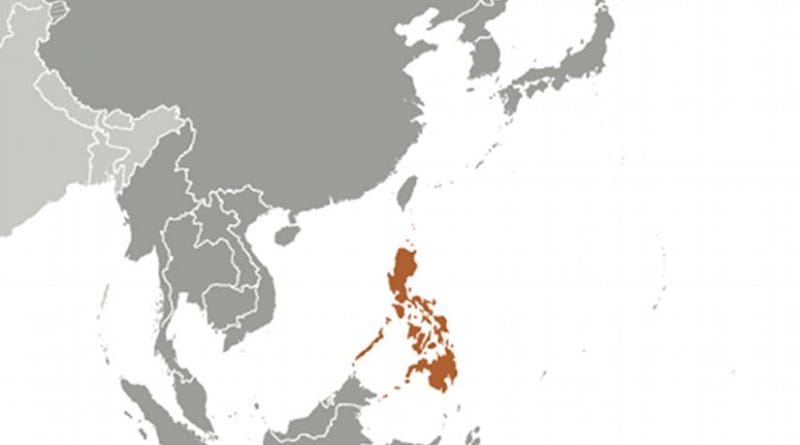Philippines: UN Official Asks To Drop Terror Tag Against Rapporteur
By BenarNews
By Jeoffrey Maitem
A senior United Nations official on Tuesday joined mounting calls for the Philippine government to remove the names of a Filipino special rapporteur and other activists from a list of communist terrorists it wanted to pursue.
Among the 600 names of alleged communist insurgents that the military had asked a local court to classify as terrorists were those of Victoria Tauli-Corpuz, the U.N. special rapporteur on the rights of indigenous peoples, and ex-Rep. Satur Ocampo. Also on the list is Joan Carling, an activist for the Indigenous Peoples Major Group for Sustainable Development, according to Erik Solheim, head of the U.N. Environment Program (UNEP).
“These charges must be dropped immediately and support provided for the legitimate activities of these individuals who have U.N. mandates and the civil society organizations with which they work,” Solheim said in a statement.
His statement came shortly after the U.N. and Human Rights Watch called for the government to clarify the list.
Three months ago, Corpuz expressed alarm over military attacks on indigenous tribes in the southern Philippines because the armed forces had tagged them as communist insurgents.
Corpuz was on the list because the military had received intelligence that she was somehow connected with the Communist Party of the Philippines (CPP) and its armed wing, the New People’s Army (NPA), Harry Roque, the spokesman for President Rodrigo Duterte, said on March 10.
“I assure everyone including the international community that this not a witch-hunt on U.N. special rapporteurs,” Roque said. “Instead, perhaps the U.N. rapporteur system should fine-tune its selection process to ensure that individuals identified with terrorist groups are not given any mandate by the U.N. Human Rights Council.”
Roque stressed that the Philippines would allow Corpuz the right to be heard.
“She can dispute the classification in the regional trial court where the petition to declare the CPP-NPA as a terrorist group is currently pending,” he said.
Corpuz was welcome to submit controverting evidence against the claim that she was a top communist member, Roque added.
Solheim claimed his agency had a long-standing relationship with Corpuz and Carling in line with its mandate as the leading global environmental authority.
“It is deeply concerning that authorities have routinely responded to the expressions of environmental and human rights defenders by criminalizing and delegitimizing their voices,” Solheim said.
He said UNEP had developed a policy promoting greater protection for environmental defenders that recognizes and relies on the critical work of people on the ground.
“It is on this basis that U.N. Environment is calling for these allegations to be dropped, and the safety of those named in the legal petition be assured,” Solheim said.
Corpuz was included on the list because of her alleged ties to CPP-NPA, Philippine Foreign Secretary Alan Peter Cayetano insisted. They have been waging a guerrilla campaign in the countryside for four decades. Military estimates placed their strength at more than 5,000 men scattered in at least 60 guerrilla fronts throughout the country.
In November 2017, Duterte ended peace talks with the communists, saying the guerrillas had reneged on their commitment to peace when members continued with attacks despite a agreeing to a ceasefire.
Duterte had hoped to end the 49-year rebellion by the time his six-year term expires in 2022. But in January, he announced he would take legal actions against the communist movement, including left-leaning political groups.
ICC
Last week, the Philippines officially notified the U.N. that it was pulling out of the International Criminal Court (ICC), saying critics were using human rights issues to undermine the government.
In February, the ICC, which is based in The Hague, said it would begin a preliminary examination of a complaint filed against Duterte over crimes against humanity because of deaths linked to his administration’s war on illegal drugs. The ICC has jurisdiction over certain serious crimes under international law including genocide, crimes against humanity and war crimes.
On Tuesday, the court, issued a statement saying that the Philippine decision to withdraw from the ICC would have “no impact on on-going proceedings or any matter which was already under consideration by the Court prior to the date on which the withdrawal became effective.”
Meanwhile, Sam Zarifi, secretary general of the International Commission of Jurists, said the Philippines should reconsider its hasty and ill-conceived decision to withdraw from the ICC.
In a letter sent to Duterte, the ICJ called on the Philippines to commit to an effective investigation of the allegations of widespread and systematic extrajudicial killings and bring to justice those responsible.
Duterte is leading a crackdown against suspected drug addicts and pushers that has left at least 4,000 dead, according to government figures. Rights groups claim the figure could reach 12,000, including deaths blamed on pro-government vigilantes.
“The Philippine government’s submitted justifications for withdrawing from the ICC are a litany of poorly thought out pseudo-legal arguments and self-serving statements that focus on President Duterte’s fear and resentment at facing questions for the horrific campaign of extrajudicial executions that his government has explicitly condoned,” Zarifi said.
“At any rate, despite what the Philippine president may wish, withdrawal from the ICC will not prevent the prosecutor from conducting a preliminary examination because the acts complained of were committed prior to the date when the withdrawal becomes effective,” Zarifi said.
He accused Duterte of bullying critics who had questioned his government’s violent methods.
“He’s now trying to avoid accountability under international law, too,” Zarifi said.
Cristina Palabay, head of the local rights group Karapatan, said Duterte’s decision was part of a ploy to paint himself as the victim of an international conspiracy.
“Unfortunately for Duterte, withdrawing from the ICC does not absolve him from anything, nor does it leave him off the hook. Moreover, withdrawal from international agreements is a constitutional matter, and should undergo proper legal processes,” Palabay said.
Mark Navales in Cotabato contributed to this report.

